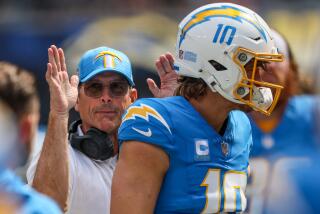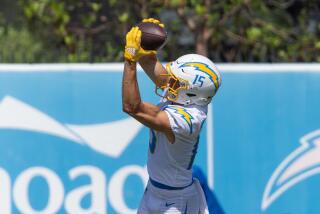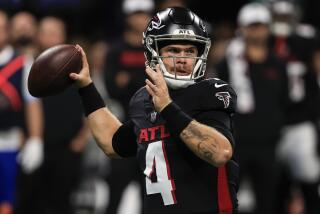Chargers’ Suit Stirs Emotions
- Share via
SAN DIEGO — With anger at the Chargers and scorn for Los Angeles, city officials here Wednesday vowed an immediate, vigorous and multifaceted legal challenge to a lawsuit filed by the Chargers that appears a precursor to a potential move to Los Angeles.
At a City Hall news conference, Mayor Dick Murphy and City Atty. Casey Gwinn said they found the timing of the suit outrageous, the issues meritless and the venue scandalous.
The suit, filed Tuesday afternoon in Los Angeles Superior Court, claims that the Chargers have exceeded so-called “trigger provisions” in their Qualcomm Stadium lease and should be allowed to negotiate with other cities if San Diego does not alter its agreement with the team.
“I would say that if they perform as well in the courtroom as they do on the field, we’ll kill them,” said a grimfaced Murphy, a reference to the Chargers’ 2-9 record.
Gwinn noted that since 1995, the city has spent $90 million to upgrade Qualcomm Stadium and $30 million on a controversial ticket-guarantee while the Chargers “have moved rapidly toward the worst record in the NFL.” The team has not made the playoffs since 1995.
In a level of fury rarely seen in San Diego civic affairs, Murphy and Gwinn blasted the Chargers’ decision to file the lawsuit in Los Angeles rather than San Diego as a “slap in the face to San Diego fans and taxpayers.”
They suggested that Charger management believes a Los Angeles jury will look more kindly on a lawsuit that could result in the return of the NFL to that city.
“Let’s be clear about what the Chargers want,” Gwinn said. “They want to move to Los Angeles and make more money.”
Murphy accused the team of “sneaking off to Los Angeles.... They don’t believe they can trust the people of San Diego to make a judgment.... I’ve been a judge and attorney for three decades and I can tell you that this is one of the most egregious examples of bad faith I’ve seen.”
Murphy said the city’s lawyers will work over the Thanksgiving weekend and deliver a game plan to the City Council in an emergency, closed session Monday.
One move will apparently be to demand that the lawsuit be transferred to San Diego.
“Los Angeles is not a neutral site,” Gwinn said.
The lawsuit apparently has put the already cool negotiations between the city and the Chargers over a new stadium into the deep-freeze.
“Personally, as long as the Chargers’ lawsuit is pending, I am dubious we can have meaningful negotiations,” Murphy said.
Murphy and Gwinn rejected a suggestion by the Chargers to submit the “trigger” issue to binding arbitration by a retired federal judge. The issue involves whether the team has exceeded its spending cap.
An arbitration process, Murphy and Gwinn said, would “not protect the fans and taxpayers of San Diego” because it would not allow for an appeal nor the kind of legal discovery process that would allow city officials to examine the team’s financial records.
Wednesday was a day like few others in the recent political history of the state’s second-largest city, as waves of angry denunciations aimed at the Chargers, their lawsuit, their legal advisor, Mark Fabiani, and the Spanos family, spilled over into the media.
Gwinn derided Fabiani -- who acts as spokesman for the Spanos family, which owns the team -- a practitioner of “spin” who cannot be trusted.
Former Councilman Bruce Henderson, a longtime critic of the city’s dealings with the Chargers and Padres, issued a statement: “I tried to warn the community but people just wouldn’t listen. Now, fans and taxpayers alike face the worst of all possible worlds.”
Former federal prosecutor Michael Aguirre, a candidate to succeed Gwinn as city attorney, called for the city to countersue and noted that he has been warning since 1997 of perfidy on the part of the Chargers and NFL to move the team to Los Angeles.
Aguirre has called for the city to refuse to pay millions of dollars under the ticket-guarantee and shift the money into a fund to pay for fire helicopters. The lack of such helicopters during last month’s wildfires that destroyed about 400 homes in the city has become a politically controversial issue.
The fires were also on Murphy’s mind. He said that filing a lawsuit at a time when the city is trying to recover emotionally and financially from the fires “is absolutely outrageous.”
Fabiani said Tuesday night that had the city agreed to binding arbitration, the Chargers were willing to eliminate the ticket guarantee for this season and next and refund the $3.6 million that the city had already paid this season to cover the cost of unsold tickets.
Although the timing of the lawsuit caught City Hall by surprise, the issues raised in the suit did not, Gwinn and Murphy said. “If the Chargers want a fight, I’m willing to give them one,” Murphy said.
The Chargers’ lawsuit promises to be a major issue in the March election in which Murphy is seeking reelection. Also, four seats on the City Council and the city attorney’s spot are on the ballot.
Councilwoman Donne Frye, a hard-liner on the issue of using public funds to build a new stadium, said the lawsuit “is just standard procedure for the Chargers management. If they don’t get what they want, they try to bulldoze people.”
Still, almost alone among officials, Frye said she was not angry.
“Basically, they don’t annoy me anymore,” she said. “I’ve moved beyond that. I know them for what they are.”


